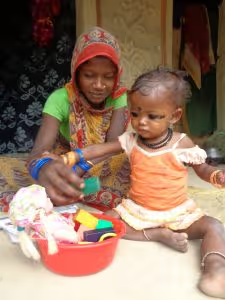Severe acute malnutrition, maternal work-load, stress and isolation – things unchanged since the earthquake

By Prathama Raghavan, Head of MHCP Department in Nepal.

Nepal was hit by two earthquakes of magnitudes 7.9 and 7.2 on 25th April and 12th May. I was out of Nepal on 25th April, when I came back on 28th April, aftershocks were still strong, we were sleeping outdoors in tents like many other people in the country for the next few nights. People were just beginning to recover from the shock and another big one hit on 12th May. After the second earthquake people were not sure if it would stop, if it was really over.
Saptari on the eastern side of Nepal in the Terai belt is 372 kms from Gorkha the epicentre of the April 25th quake. Our teams and families in Saptari felt the earthquakes and were scared to go back into their homes in the following days. Aftershocks were felt less and there was less damage to infrastructure and homes, no lives were lost. Things went back to a normal routine faster than in the most affected districts. People from the Terai plains of Nepal living in Kathmandu moved back to their homes in the Terai for safety. But the problems that were in the Terai remain. As attention in the country shifts to the earthquake affected areas and government funds and attention are diverted to the districts most-affected by the disaster, in Saptari mothers still struggle with their work load, lack of social support and the additional stress of a sick child with Severe Acute Malnutrition. Saptari has one of the highest rates of malnutrition in Nepal - 2.9% as compared to the national 2.6% (ACF nutrition survey, June 2013). Nepal’s burden of vulnerabilities has increased considerably, while important post-disaster work continues, the issues that were present before the earthquake, still need to be continually addressed.
Saptari is one of the districts with the highest number of migrant labourers in the country. Men travel to the middle-east, to India, Malaysia, etc. for work often under poor working conditions with little possibility of frequent contact and communication with their families. Women in Saptari often bear the full load of house and farm work. The socio-cultural norms require a woman to leave her maternal home when she gets married to live in her marital home. This practice means that women cannot and do not expect support from their maternal homes when their marital home is unwelcoming or presents difficulties. Thus moving to a new family, a new home and having to adapt completely to a new situation with little support could be a difficult experience.
Many mothers of the FUSAM research project on treatment and follow-up of children with Severe Acute Malnutrition report being isolated and having little or no time for themselves. The psychosocial support program part of the FUSAM research though focussing on child care practices aims to help the mother find more autonomy in her life and recognises the mother as an important partner and ally in the treatment process. The mother’s well-being directly affects her capacity to care for her child. Empowering her with tools to improve child care practices increases the mother’s self-esteem and helps her advocate for herself and her child within the marital family. With this objective the FUSAM research seeks to study the additional value of psychosocial support combined with the medico-nutritional treatment of Severe Acute Malnutrition through the provision of therapeutic food for the malnourished child.
Stay updated
Sign up for our newsletter to receive regular updates on resources, news, and insights like this. Don’t miss out on important information that can help you stay informed and engaged.
Related articles


.png)
Explore Elrha
Learn more about our mission, the organisations we support, and the resources we provide to drive research and innovation in humanitarian response.